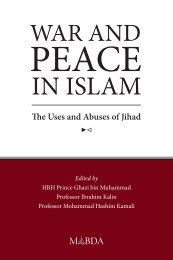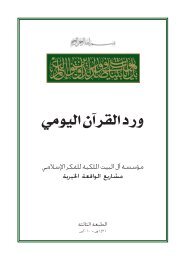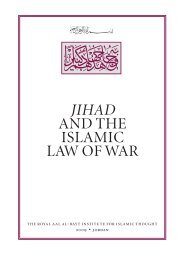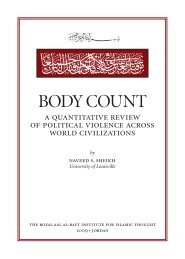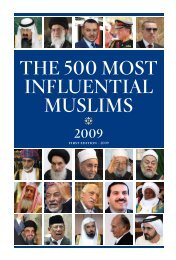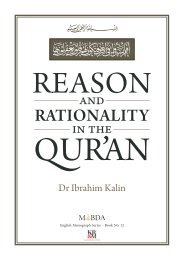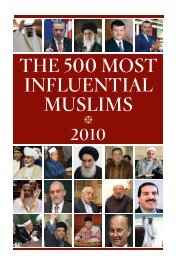Al-W¥^idÏ's Asb¥b al-Nuz‰l - The Royal Islamic Strategic Studies ...
Al-W¥^idÏ's Asb¥b al-Nuz‰l - The Royal Islamic Strategic Studies ...
Al-W¥^idÏ's Asb¥b al-Nuz‰l - The Royal Islamic Strategic Studies ...
Create successful ePaper yourself
Turn your PDF publications into a flip-book with our unique Google optimized e-Paper software.
Asbab <strong>al</strong>-Nuzul<br />
said: ‘That is up to <strong>Al</strong>lah, He will do it if He wills’. One of them said: ‘We will not believe in you until you<br />
bring <strong>Al</strong>lah and the angels as warrants. ‘Abd <strong>Al</strong>lah ibn Abi Umayyah <strong>al</strong>-Makhzumi — the son of ‘Atikah<br />
bint ‘Abd <strong>al</strong>-Mutt<strong>al</strong>ib, the matern<strong>al</strong> aunt of the Prophet, <strong>Al</strong>lah bless him and give him peace — said: ‘I will<br />
never believe in you until you get a ladder and climb up to heaven while I am watching you, and bring an<br />
unfolded Scripture with you and a group of angels to testify about what you say’. <strong>The</strong> Messenger of <strong>Al</strong>lah,<br />
<strong>Al</strong>lah bless him and give him peace, left to his family very sad for failing to get his people to follow him<br />
as well as for the antagonism they displayed toward him. And so <strong>Al</strong>lah, ex<strong>al</strong>ted is He, reve<strong>al</strong>ed (And they<br />
say: We will not put faith in thee till thou cause a spring to gush forth from the earth for us…). 15<br />
Sa‘id ibn Ahmad ibn Ja‘far informed us> Abu ‘<strong>Al</strong>i ibn Abi Bakr <strong>al</strong>-Faqih> Ahmad ibn <strong>al</strong>-Husayn ibn<br />
<strong>al</strong>-Junayd> Ziyad ibn Ayyub> Hushaym> ‘Abd <strong>al</strong>-M<strong>al</strong>ik ibn ‘Umayr> Sa‘id ibn Jubayr who said: “I said<br />
to him [to ‘Abd <strong>al</strong>-M<strong>al</strong>ik ibn ‘Umayr]: ‘<strong>The</strong> words of <strong>Al</strong>lah (And they say: We will not put faith in thee<br />
till thou cause a spring to gush forth from the earth for us) was it reve<strong>al</strong>ed about ‘Abd <strong>Al</strong>lah ibn Abi Umayyah’<br />
He said: ‘This is what they claim’ ”. 16<br />
(Say (unto mankind): Cry unto <strong>Al</strong>lah, or cry unto the Beneficent…) [17:110].<br />
Said Ibn ‘Abbas: “One night in Mecca, <strong>The</strong> Messenger of <strong>Al</strong>lah, <strong>Al</strong>lah bless him and give him peace,<br />
stood up for the night vigil prayer. He kept saying in his prostration: ‘O Beneficent, O Merciful!’ And so<br />
the idolaters said: ‘Muhammad used to c<strong>al</strong>l unto one <strong>Al</strong>lah; now he is c<strong>al</strong>ling unto two gods: <strong>Al</strong>lah and<br />
the Beneficent. We do not know of anyone by the name of the Beneficent except the beneficent of <strong>al</strong>-<br />
Yamamah (meaning Musaylimah the liar)’, and so <strong>Al</strong>lah, ex<strong>al</strong>ted is He, reve<strong>al</strong>ed this verse”. 17<br />
Said Maymun ibn Mihran: “At the beginning of revelation, the Messenger of <strong>Al</strong>lah, <strong>Al</strong>lah bless him and<br />
give peace, used to write ‘In Thy name, O <strong>Al</strong>lah’ until this verse was reve<strong>al</strong>ed (Lo! It is from Solomon, and<br />
lo, it is: In the name of <strong>Al</strong>lah the Beneficent, the Merciful) [27:30], after which he <strong>al</strong>ways wrote ‘In the name<br />
of <strong>Al</strong>lah the Beneficent, the Merciful’. <strong>The</strong> Arab idolaters then commented: ‘We know this Merciful but<br />
who is the Beneficent’ As a response, <strong>Al</strong>lah, ex<strong>al</strong>ted is He, reve<strong>al</strong>ed this verse”. 18<br />
Said <strong>al</strong>-Dahhak: “<strong>The</strong> people of the Book said to the Messenger of <strong>Al</strong>lah, <strong>Al</strong>lah bless him and give him<br />
peace: ‘You mention very little the Beneficent and yet <strong>Al</strong>lah mentions this name in the Torah in abundance’.<br />
<strong>Al</strong>lah, ex<strong>al</strong>ted is He, reve<strong>al</strong>ed this verse as a response to them”.<br />
(And thou (Muhammad), be not loud-voiced in thy worship nor yet silent therein, but follow a way<br />
between) [17:110].<br />
Abu ‘Abd <strong>Al</strong>lah Muhammad ibn Ibrahim ibn Muhammad ibn Yahya informed us> his father> Muhammad<br />
ibn Ishaq <strong>al</strong>-Thaqafi> ‘Abd <strong>Al</strong>lah ibn Muti‘ and Ahmad ibn Mani‘> Hushaym> Abu Bishr> Sa‘id<br />
ibn Jubayr> Ibn ‘Abbas who said regarding the words of <strong>Al</strong>lah, ex<strong>al</strong>ted is He (And thou (Muhammad), be<br />
not loud-voiced in thy worship nor yet silent therein…): “This verse was reve<strong>al</strong>ed while the Messenger of<br />
<strong>Al</strong>lah, <strong>Al</strong>lah bless him and give him peace, was in hiding in Mecca. Whenever the unbelievers heard the<br />
Qur’an being recited, they reviled it and reviled the person who had brought it. Hence, <strong>Al</strong>lah, glorious<br />
and majestic is He, said to His Prophet, <strong>Al</strong>lah bless him and give him peace (And thou (Muhammad),<br />
be not loud-voiced in thy worship) i.e. upon reciting the Qur’an in prayer, lest the idolaters hear it and<br />
revile the Qur’an, (nor yet silent therein) such that your Companions do not hear you, (but follow a way<br />
between)”. 19 This was narrated by Bukhari from Musaddid and by Muslim from ‘Amr <strong>al</strong>-Naqid, and both<br />
Musaddid and ‘Amr related it from Hushaym.<br />
15<br />
Tabari, :159-160; Qurtubi, :328.<br />
16<br />
Durr, :339.<br />
17<br />
Tabari, :182; Qurtubi, :342; Durr, :348.<br />
18<br />
Qurtubi, :243<br />
19<br />
Tabari, :185; Qurtubi, :343; Durr, :348-349.<br />
150



